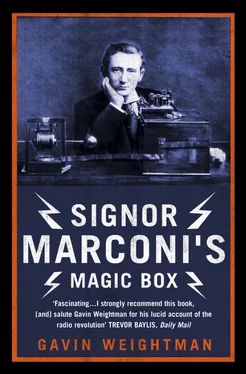1 ...6 7 8 10 11 12 ...17 However, the City of London was mightily impressed. The potential value of what Marconi had demonstrated out on Salisbury Plain and at Toynbee Hall, and now across the Bristol Channel, lay, as far as the City investor was concerned, almost entirely in the patent rights. If an exclusive legal claim to the mechanism in the magic boxes could be established, this patent could be sold around the world, bringing instant riches. As early as March 1896, barely a month after his arrival in London, Marconi was writing to his father at the Villa Griffone with details of offers that were being made to him by various members of the extensive family contacts of the Jamesons. There was a Mr Wynne, who was related to his cousins the Robertsons, offering £2400 if Marconi would allow him to set up a company in which he would be given half the shares. Then there was another cousin, Ernesto Burn, a lieutenant in the Royal Engineers, who told Marconi he had a friend who had been paid £10,000 by the British government with a stipend of £2000 a year for ‘a discovery useful to the army’.
While Marconi, staying in Bayswater with his mother, conducted a frantic round of meetings in an effort to find a backer for his invention, his father offered advice which reflected his hope that Guglielmo would cash in as fast as he could and return with his spoils to buy a property near the Villa Griffone. Some solace from home arrived in two barrels of Griffone wine, which Marconi arranged to have bottled. In his letters home he pleaded not for wine but for the funds to pay for patent rights not only in England but in Russia, France, Italy, Germany, Austria, Hungary, Spain, India and the United States. In January 1897 he had written to his father:
I met two American gendemen who are willing to acquire my patent rights for the United States of America … I understand they would give me £10,000 divided as follows: four thousand immediately and six thousand when the patent is granted by the American Government … I believe it may be better for me to accept one of these early offers … even in the case something goes wrong with the other applications I would still have made a considerable profit.
A sense of urgency, of being on the brink not only of international fame but of a fortune, runs through the letters to old Giuseppe, and was the driving force in Marconi’s life after his arrival in London. This conviction that they were onto something which could bring them all riches was evidently shared by his mother’s side of the family, and their willingness to gamble a small fortune on Marconi arose from the pressure to prevent others from profiting from his invention. There was, at the same time, an underlying anxiety about the validity of the young man’s claim to have devised a genuinely unique technology, for in a very real sense every piece of his ingeniously fashioned and beautifully crafted equipment was derived from the experimental work of others. Marconi himself was acutely aware of this, and it took the very best patent lawyers in London months to find a form of words which amounted to a convincing case that in assembling bits and pieces devised in laboratories in Germany, France, England and Italy – coils, spark gaps and ‘coherers’ – Guglielmo Marconi had arrived at a unique arrangement.
Marconi’s blood had run cold when in 1896 he met on Salisbury Plain a companionable young man, Captain Henry Jackson of the Royal Navy, who told him that he too had been experimenting with Hertzian waves, and had actually built and operated a wireless telegraphy system which had been given a trial run on a battleship, with some success. According to Captain Jackson, as Marconi listened he became crestfallen, and it was only when the naval officer assured him that this work was top secret, and there were no plans to apply for a patent, that he cheered up. William Preece, during his brief honeymoon with Marconi, would insist on basking in the reflected glory of having ‘discovered’ the Italian inventor, and continued to lecture to audiences around the country on the great value this new sort of wireless telegraphy might have for lightships and lighthouses. Preece’s promotion of Marconi infuriated one of the leading English scientists of the day, Professor Oliver Lodge of Liverpool University.
Preece and Lodge had a longstanding feud about the best way to erect lightning conductors – the Post Office had hundreds of them, to protect the telegraphy system from storms – and Lodge could not abide what he regarded as Preece’s ill-informed recounting of the miraculous Marconi invention. An undignified spat broke out on the pages of The Times. ‘It appears that many persons suppose that the method of signalling across space by means of Hertzian waves received by a Branly tube of filings is a new discovery made by Signor Marconi,’ Lodge wrote in a letter to The Times in June 1897. ‘It is well known to physicists, and perhaps the public may be willing to share the information, that I myself showed what was essentially the same plan of signalling in 1894. My apparatus acted vigorously across the college quadrangle, a distance of 60 yards, and I estimated that there would be a response up to a limit of half a mile.’
By that time Marconi had already demonstrated that the range of wireless waves was not as limited as Lodge claimed. Lodge protested that he did not mean that half a mile was the absolute limit, and commended Marconi for working hard ‘to develop the method into a commercial success’. In the same letter he continued: ‘For all this the full credit is due – I do not suppose that Signor Marconi himself claims any more – but much of the language indulged in during the last few months by writers of popular articles on the subject about “Marconi waves”, “important discoveries” and “brilliant novelties” has been more than usually absurd.’
While this storm was brewing between his bearded benefactor and the piqued professor, the Jameson family freed Marconi from Preece’s patronage. His father Giuseppe was persuaded to put up the £300 necessary to pay for legal expenses in procuring patents. Then his cousin, the engineer Henry Jameson-Davis, raised £100,000 in the City, mostly from corn merchants connected with the Jameson whiskey business. The Wireless Telegraph and Signal Company was set up with this substantial investment, equivalent to more than £5 million in today’s money. It was a commercial venture, the sole purpose of which was to buy the patents and give Marconi the money he needed to continue his experiments. He got sixty thousand of the £1 shares, £15,000 for his patents and £25,000 to spend on research. It was a massive vote of confidence from his mother’s family and their business associates.
Henry Jameson-Davis was not acting in a sentimental fashion by raising this huge sum for his cousin. Jameson-Davis was the archetypal Victorian gendeman, a keen foxhunter who would be out with the hounds in Ireland and England as often as six times a week in the winter hunting season. He would not gamble family money on a twenty-three-year-old with an intriguing but largely untried gadget without good reason. He and the other investors hoped to make a fortune when in July 1897 the Wireless Telegraph and Signal Company opened its offices at 28 Mark Lane in the City. By buying the patent rights as soon as they were awarded, the company put William Preece and the British Post Office out of the picture, and left Marconi to get on with the work of demonstrating what a valuable invention the newly formed company owned.
Marconi anticipated that Preece would not take kindly to being supplanted by a family concern, and on 21 July 1897 he wrote to him from the Villa Griffone explaining his position. All the governments of Europe, he said, wanted demonstrations of his equipment, his patents were being disputed by the likes of Professor Oliver Lodge in England and others in America, and he needed money to refine his equipment, take out new patents and fund more ambitious experiments. His letter concluded: ‘Hoping that you will continue in your benevolence towards me I beg to state that all your great kindness shall never be forgotten by me in all my life. I shall also do my best to keep the company on amicable terms with the British Government. I hope to be in London on Saturday. Believe me dear Sir, yours truly G. Marconi.’
Читать дальше












